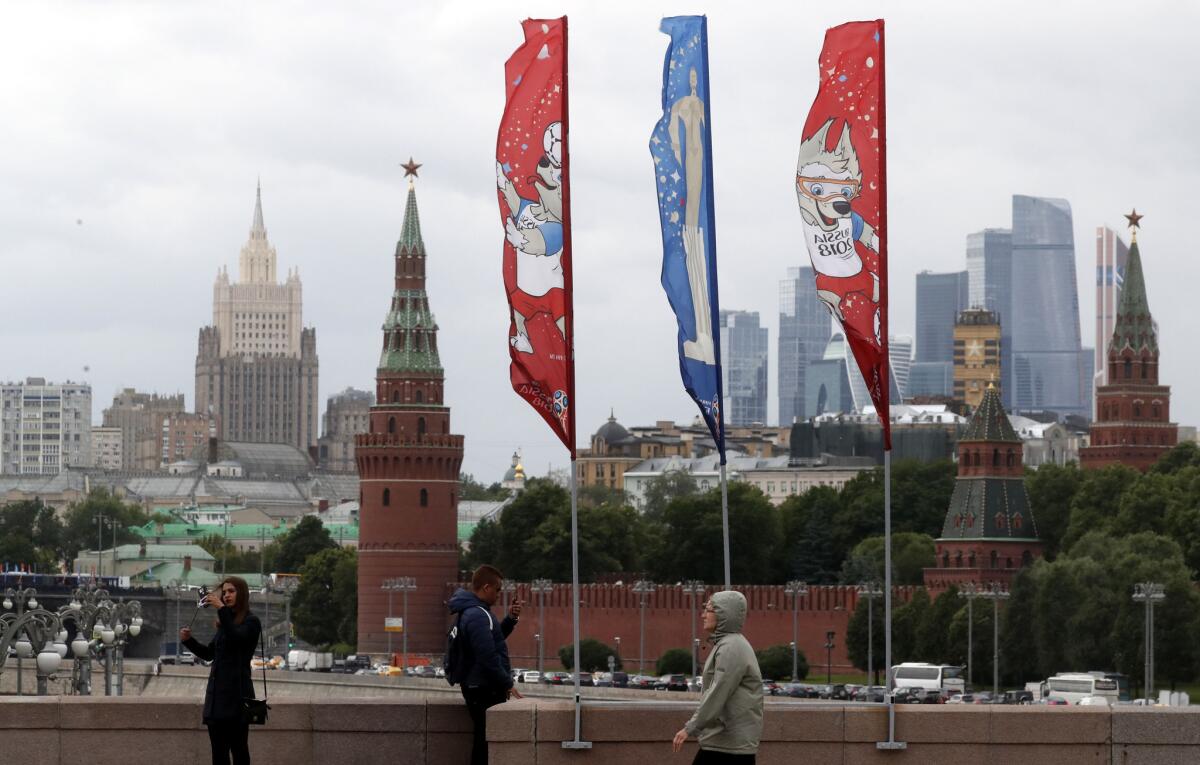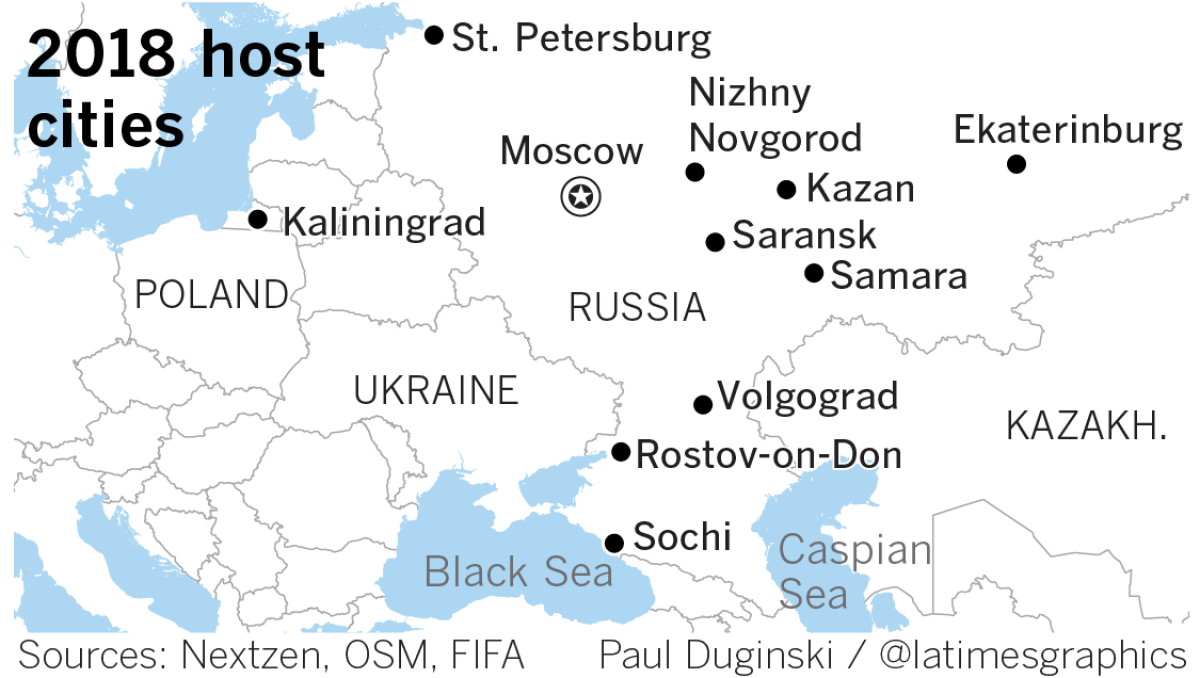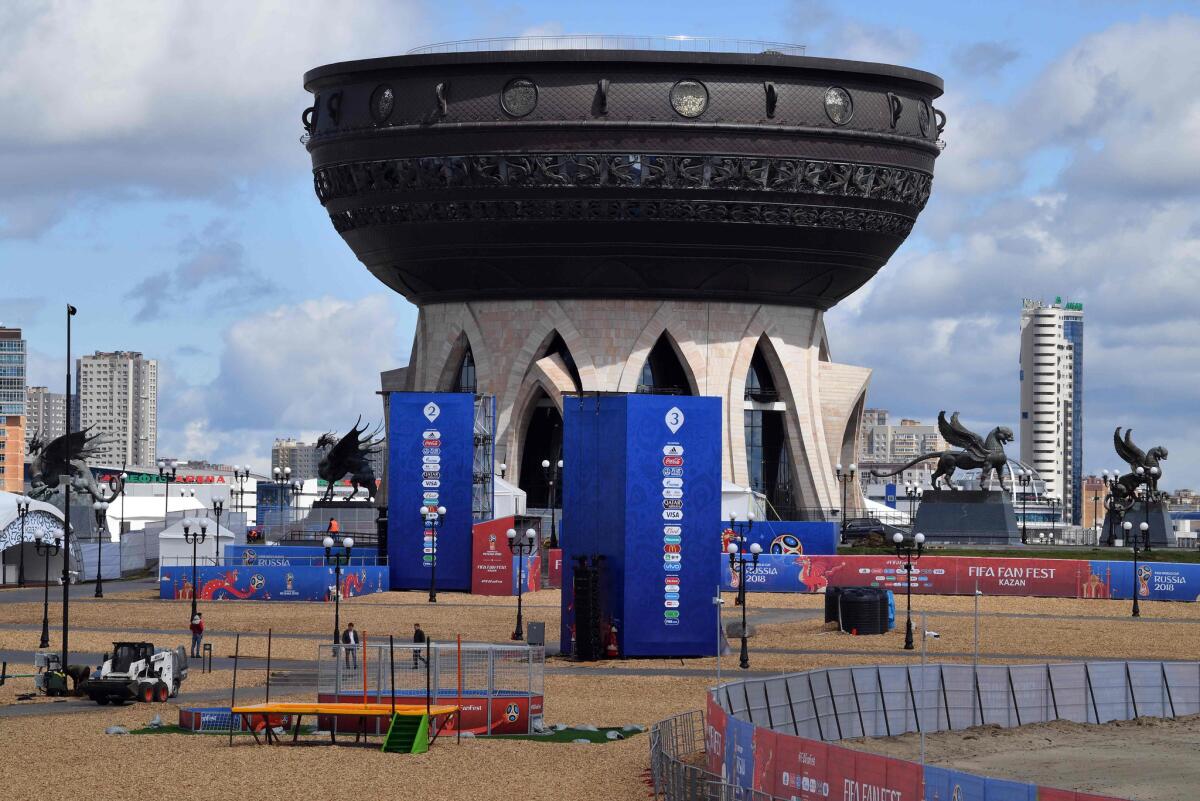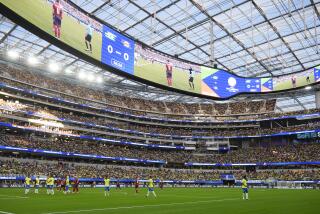World Cup: On eve of World Cup, some fear the soccer will give way to chaos
Reporting from MOSCOW — As a young soccer player — one good enough to make an age-group national team — Jules Boykoff dreamed of someday going to a World Cup.
Just not this World Cup, this summer, in this country. He fears the tournament that kicks off Thursday in Russia won’t be a dream but a nightmare.
Two decades after retiring, Boykoff is among a growing number of current and former players, academics, activists and fans — he is all four, by the way — who worry that intolerance, Russian nationalism and the country’s virulent soccer hooligan subculture will create a toxic mix that could cause the 31-day, 11-city celebration to devolve into violent street clashes that overshadow the competition.
Full coverage: 2018 World Cup »
“There’s no question we have a recipe for disaster,” said Boykoff, a professor of politics and government at Pacific University in Forest Grove, Ore.
Andrew Bertoli, a foreign policy and national security fellow at the Dickey Center for International Understanding at Dartmouth, agrees. Bertoli recently completed a study on the ties between nationalism and international sports.
“International sports are a realm that attracts people [who] sort of get a free pass to be very nationalistic,” Bertoli said. “It’s that combination that makes international sporting events hotbeds for nationalistic violence.”
The Russian World Cup has been troubled by politics from the start, when the country was awarded the tournament by FIFA in a 2010 vote wildly believed to have been tainted by corruption.
President Vladimir Putin saw the tournament as a chance to improve the image of his country, which remains under crushing international sanctions. But it’s unlikely that a soccer tournament will wash away the stains of Russia’s annexation of Crimea, its alleged interference in elections in the U.S. and elsewhere, its role in the war in Syria and a poisoned spy in Britain.
Last week the U.S. Congress weighed in when representatives Marcy Kaptur (D-Ohio) and Ileana Ros-Lehtinen (R-Fla.) introduced a resolution condemning Russian transgressions against international law and FIFA values.
“As the world turns its eyes toward the World Cup in Russia, with billions of viewers across the world, our resolution makes it clear that Congress has not forgotten Russia’s continued campaign of disinformation and electoral meddling, human rights abuses and violence across the world,” Kaptur said. “We must stand united against forces of tyranny, not undermine global sanctions against Russia by providing them with a windfall of tourism, likely to only benefit Putin’s rich oligarch friends.”

Russia is looking inward, hoping clean streets, trains that run on time and a peaceful, welcoming tournament will change hearts and minds. It is cracking down hard to make sure nothing spoils the party.
It’s a massive reversal for a government that cheered disruption at Europe’s last major international soccer competition two years ago, while at home it has ignored racism and anti-Semitism and enacted anti-gay legislation.
“You put your best face forward when the eyes of the world are there to watch you on global television,” Boykoff said. “Human rights-abusing countries often use sports mega-events to reputation-wash under the spotlight.”
So the same Russian leaders — Putin among them — who applauded the country’s well-armed soccer hooligans for instigating brawls during the 2016 UEFA European Championship in France have begun warning the same hooligans against trying that at home.
Some fan groups linked to soccer-related violence report surveillance and threats from Russian law enforcement and say they’ve been told they will face lengthy prison sentences if there is trouble at the World Cup.
“If there are problems,” one fan group leader told the Associated Press, imitating an officer, “then those guys are in prison and you’ll be joining them. We need everything to go quietly.”
Officials also have taken measures to control who gets into the World Cup stadiums. Tournament tickets are worthless without a Russian government-issued “Fan ID” — a chipped identification issued to ticket-holders who have been vetted by security services. Fan IDs already have been denied to several thousand Russians, and the United Kingdom reportedly has prevented around 1,700 high-risk fans from even traveling to Russia because of security fears.
Physical violence will be only one concern inside the stadium. According to research by the London-based Fare Network and Moscow’s Sova Center, the prevalence of neo-Nazi songs and monkey chants aimed at visiting black players more than doubled over the last two seasons in Russia.
“These levels of discriminatory chanting indicate that xenophobic views remain deeply rooted among many Russian football fans,” the report concluded.
In response Fare last month produced a guide to Russia for visitors — available online at diversityguide2018.com — and will staff a helpline where fans can report harassment or attacks, while Russia hired former player Alexei Smertin as an anti-racism inspector. Questions immediately were raised about Smertin’s sincerity when he used a BBC interview to blame the outside world for the country’s race problems.
“There’s no racism in Russia,” he said. “It comes from aboard, from different countries. It was never, ever here before. Ten years ago some fans may have given a banana to black guys. It was just for fun.”

While Smertin was denying Russian racism, FIFA was confirming it, penalizing three Russian clubs for allowing their fans to chant Nazi slogans and yell racist chants at visiting black players this spring.
Last month Nigeria defender Bryan Idowu, who was born and raised in Russia, said some fans in the country view racist abuse not as an ideology but as a tactic to distract opposing players. Even national team goalkeeper Guilherme Marinato, a naturalized citizen from Brazil, was twice targeted by fans who called him a monkey.
Before a Confederations Cup match involving Cameroon, fans in Sochi painted their faces black and marched through the streets. Sochi will host six World Cup game and Boykoff worries that kind of behavior could again spill into the streets, where fans banned from entering the venues are likely to congregate.
“There’s plenty of bigotry, xenophobia and sort of hyper-nationalism coming through the outer edges of Russian football hooligan culture,” he said, repeating the findings of the Fare Network report.
“The real threat during the World Cup is going to be outside the stadiums in either unpoliceable or lightly policed venues. It all does very much depend on how committed the Russians are to both stopping street fighting and protecting the rights of visiting tourists to express their identities or just to be African.”
Bertoli has the same concerns. If the Russian president decides the World Cup could be more useful for building support internally than internationally, his approach to security could change.
“I’m not sure what Putin wants,” he said.”He definitely has the power to crack down on any type of rioting if he wants to. But it’s also possible he’d encourage some of it because that would rev up more nationalism and increase the popularity of his regime in Russia.
“So he’s got maybe some domestic incentives to allow some violence to happen and international incentives to keep things as violence-free as possible.”
Putin isn’t the only one who needs a successful World Cup. This tournament is the first major event of the post-Sepp Blatter era, and that makes it both a test and an initiation for FIFA’s new president, Gianni Infantino.

There’s still little agreement on whether Infantino has done enough to clean up world soccer in the wake of the corruption scandal that drove Blatter from power. Infantino’s coming out party in Russia might be a tough sell. While FIFA issued positive ticket sales numbers, hotel bookings are lagging and sponsorship sales have been slow.
Meanwhile concerns over terrorism have led officials to close sea ports near some of the World Cup’s 11 host cities to potentially dangerous cargo. No-fly zones have been expanded and anti-drone equipment has been deployed across the sprawling country. World Cup sites also will be protected by soldiers using missiles and other weapons with squadrons of warplanes on high alert.
Russia has been the site of several deadly terrorist attacks over the last eight years, including suicide bombings at a Moscow airport and in the city’s subway system, two attacks in Volgograd and another suicide bombing in St. Petersburg. All three cities will play host to World Cup games.
“There’s no question that Russia is a political tinderbox,” Boykoff said. “And there’s plenty of animosity to go around right around Russia.
“The tensions are extremely high. To recent memory, the most tense going into it, in terms of all the sort of geopolitics that are ghosting behind the World Cup.”
[email protected] | Twitter: @kbaxter11







